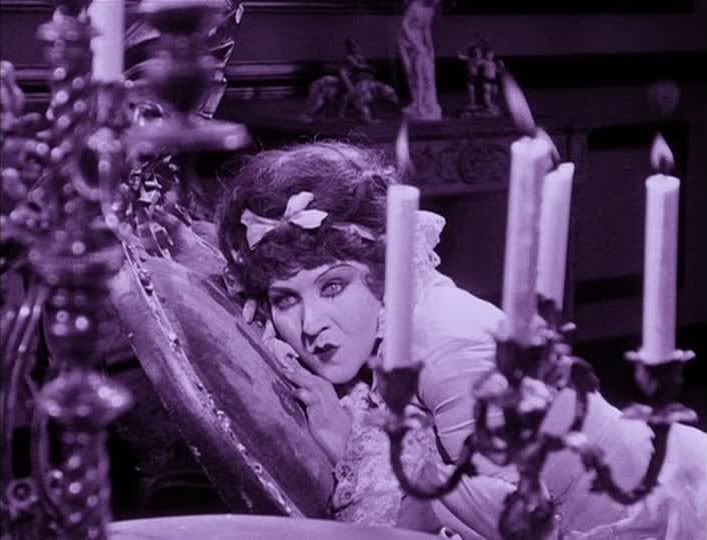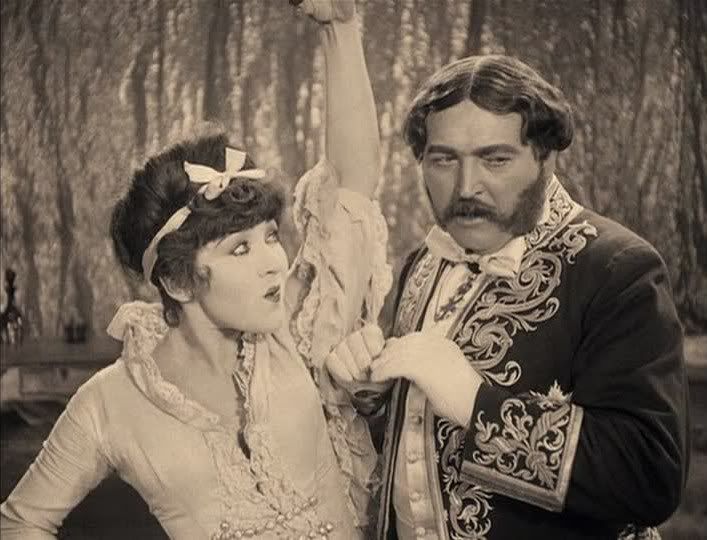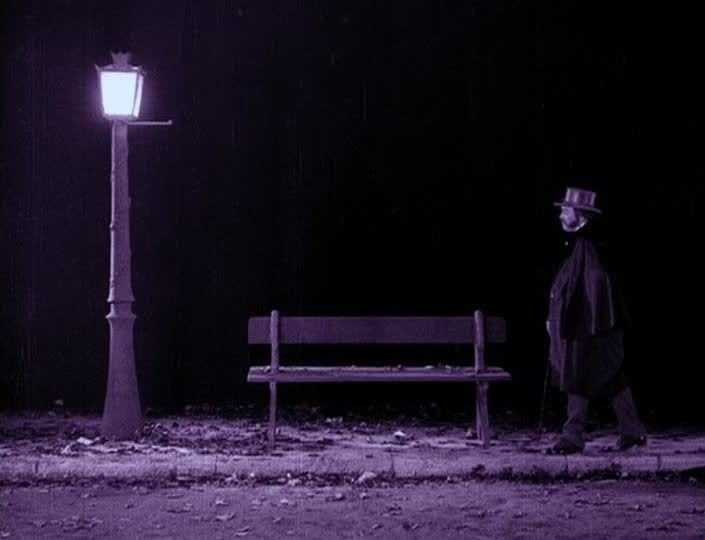
Jean Renoir's second silent feature, Nana, is a tragic, melodramatic satire based on an Emile Zola novel about a failed actress who becomes an obsession of multiple upper-class men, corrupting the noble class with her crass, vulgar ways. For the role of this remarkable young woman, Renoir cast his then-wife Catherine Hessling, the star of several of his earliest films and an actress who was, to say the least, something of an acquired taste. Bold, brash, and extremely limited in her range, Hessling was nevertheless something of an inspired choice to play the corrupting influence Nana, who leads men to their doom with her pouting and mugging, her shameless flirting and her manipulative use of her own sexuality.
It's very interesting that Renoir would cast his wife in a role like this, and the film creates some bizarre subtexts surrounding this woman. Renoir is casting his wife as a terrible actress who's stereotyped as a tramp and a seductress, not fit for serious or "elegant" roles; when she tries out for the part of an elegant duchess, her fellow performers laugh her out of the room. When she gets the part anyway through the influence of her wealthy suitor, Count Muffat (Werner Krauss), she's booed off the stage, though Renoir at least spares her that indignity with an ellipsis, showing her running offstage in tears afterwards. Nana is brash and vulgar, defiantly lower-class, but somehow she manages to attract all these stuffy upper-class men who are seduced by her sour-puss scowl and her hip-shaking insinuations of sexual abandon. When Nana gets up on stage and dances lustily, she earns raucous cheers, and Renoir highlights the class divide in the audience by showing the lower rows recklessly getting involved in Nana's bold performance, while when some of the gentlemen in the more sophisticated regions of the theater get caught up in the act, those around them display their disdain for such unfettered shows of appreciation.
In many ways, Hessling's limited range actually makes her a perfect fit for Nana. She can be a frustrating actress, displaying the same sour expression and widened eyes for virtually every emotion from sadness to ecstasy, but Nana's not exactly supposed to be a subtle or likeable character herself. She's a force of nature, an embodiment of the lower-class invasion of the nobility, a theme that Renoir would go on to explore far more subtly and powerfully in later films, but is already at the center of this sophomore film. Nana revels in her humiliation of these wealthy men with their titles and their fortunes: in one of the film's most potent sequences, she actually makes Muffat beg like a "fat little puppy" for a piece of chocolate, placing his hands under his chin like a dog begging for a treat. She debases these men, driving them to crime and fetishism. One of her suitors, the effeminate, ineffectual young Georges (Raymond Guérin-Catelain), hides in her closet so he can smell her dresses, from which vantage point he witnesses Muffat's debasement, which seems to teach him something ugly about himself as well.


Though Nana quits the stage towards the beginning of the film, in many ways she remains an actress in her new "career" as a courtesan, performing for men, acting out a glamorous lifestyle that elevates her above her previous station into the company of sophisticated men with fancy titles. Renoir repeatedly films her luxurious room in wide shots that make it look like a stage, complete with proscenium arch. Nana leaves the theater but makes her whole life a kind of performance instead, another way in which Hessling's theatrical performance style fits this character so well.
Renoir, working under the strong influence of Erich von Stroheim, adopts a lush, sophisticated, self-assured style here, very different from the blend of naturalism and surreal visual effects in his debut La fille de l'eau. The film's style is big and lavish, capturing the trappings of wealth and privilege that Nana so incongruously wraps around herself. But Renoir also movingly depicts the emptiness and melancholy lurking at the center of this lifestyle: all this money, the manipulations and seductions, leaves this gaping emotional hole that's filled with suicides and psychologically motivated illnesses and the other usual melodramatic tragedies, but also with a general atmosphere of gloom that's communicated in Renoir's elegant visual style. There are numerous shots here that capture that melancholy undercurrent: Nana reclining on her couch, her face framed by flickering candles; Muffat strolling through a dark night that closes in around him, lit up only by a lamp post high above, barely piercing the inky blackness that smothers him.
Nana is an early indication of Renoir's satirical sensibility being directed at the bourgeois and the nobility, with Hessling's Nana serving the same casually destructive role that Michel Simon would later take on in more refined, fully developed films like Boudu Saved From Drowning. Renoir was still finding his voice here, but Nana is still both a fine film in its own right and an early glimpse of the director's developing style and concerns.

2 comments:
A remarkable film. Renoir was madly in love with her -- and as might be expected could not hold onto her.
I have been told that towards the end of his life Renoir's friends would screen his films for him. When Nana was shown the great man began sobbing "Oh Catherine, Catherine! Why did I ever let you go?" The last Mrs. Renoir was not amused.
Yes, a magnificent early Renoir indeed, and you say it all in your final paragraph summary. Renoir was remarkable that he had a run with few mis-steps even in the early going. Beautiful piece here.
Post a Comment